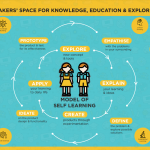
The STEM (Science, Technology, Engineering and Mathematics) mind-set and scientific process skills are the need of the 21st century as they
- help question and challenge stereotypes, myths and superstitions,
- enable better political decisions,
- enable better economic returns,
- enable improved individual behaviours, and
- help to create a more ethical world.
While preparing learners for the 21st-century, shifting one’s abilities from being only a consumer of technology to a creator of technology will help learners to pursue their personal or professional goals. It will give them the right knowledge to know how and when to be concerned about their safety in this new digital world.
This new world, however, carries with it many of the inequities present for many decades from the old world. The lack of women leveraging the opportunities presented by this new sphere is only increasing the divide in society. This curriculum focuses on ensuring that all learners – regardless of gender, examine the opportunities and challenges present in pursuing STEM careers and recognise and challenge norms that lead to the creation of an unequitable world.
LEARNING OUTCOMES Through the 3-year program, the learner will:
- Become aware of self: their strengths, interests and abilities, aspirations, influences in terms of family and socialisation process, their beliefs, biases and mindsets including gender norms
- Become change agents creating solutions using tech and non-tech methods: able to reflect on everyday lived realities to recognize the problem and apply scientific inquiry processes to create equitable and sustainable environments
- Expand their understanding of career and career options available: able to research career information, understand the diversity of careers available, and understand STEM careers, future career trends and technology, understand how gender influences career decisions
- Inculcate and demonstrate 21st-century skills including scientific literacy and computational thinking: ability to communicate, express, work collaboratively, think critically, research, analyse and make informed decisions specially to challenge gender norms
In Year One, the focus is on:
SELF-AWARENESS
– Discover the importance of practising self-awareness specifically for personal and professional goal-setting.
– Recognize how self-perception and esteem and others’ perception influences a confident identity creation. e.g. the roles they play, the qualities, aspirations they have
– Examine self-beliefs, biases and mindsets and recognise various stereotypes.
COMMUNICATION SKILLS
– Listen actively and incorporate suggestions from group feedback into own work after the evaluation.
– Demonstrate constructive feedback giving practises during project share-out sessions.
– Seek information online in an efficient manner i.e. using keywords, search engines.
CRITICAL THINKING
– Identify the role gender stereotypes play in influencing perception.
– Apply the STEM mindset to challenge, question and verify gender stereotypes and myths.
– Create projects that demonstrate solutions using design for change as an approach.
– Create projects that demonstrate digital fluency: sequencing, looping, events, parallelism using an open-source, visual programming platform called Scratch.
– Discover remixing of projects on the Scratch Platform and how to leverage it to create more projects.
CURRICULUM APPROACH
In this curriculum, learners are introduced to basic concepts around self, gender stereotypes, computational thinking and they do projects to consolidate their understanding and present to their communities: classmates, teachers and their parents.
Using an Open-Source Visual Programming platform.
These projects are created using an open-source visual programming platform called Scratch developed at the MIT Media Labs, USA.






